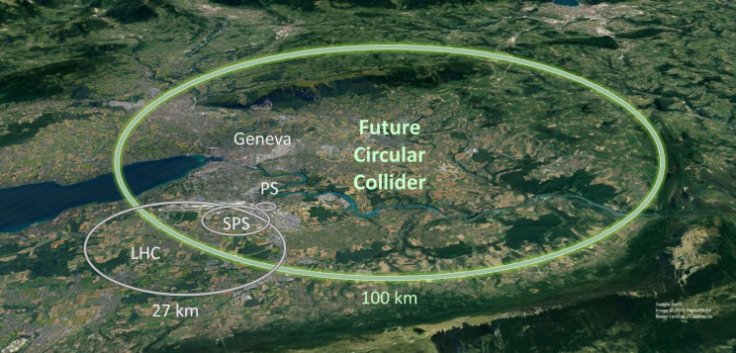The 27-kilometer Large Hadron Collider (LHC) at the European Organization for Nuclear Research or CERN has been a tremendous help for scientists to research on particle physics. Now, CERN is planning something even bigger to further its studies on particle physics and the Higgs bosons.
Named Future Circular Collider or FCC, it will be a giant particle accelerator at 100-kilometer, compared to the current LHC at a mere 27-km, the Geneva-based organization said in its report last week. The project, which got the green signal, will cost around a whopping 21 billion euros and if funding is complete at its earliest, it will be fully operational by 2038.
Even Larger Collider
The 100-km FCC, which will also be built under CERN's location in Geneva, Switzerland, will collide electrons with their anti-matter positrons to further study the factors of Higgs boson, an elementary particle named after Peter Higgs. It will also help the physicists understand the deeper mysteries of the universe such as the nature of dark matter and possibly find it.
"It's probing nature at the shortest distances and looking for the smallest things we can see. It's a real exploratory mission," Professor Jon Butterworth of University College London said during CERN's council meeting which approved the project. "Everyone agrees that's what we need to do. The question has been: what's the best machine to do it?"

The project will be completed in two stages — first the electron-positron collider and later a proton-proton smasher which will need collision energy of up to 100 teraelectronvolts (TeV). Currently, the most powerful proton smasher, LHC, consumes up to 16 TeV. FCC will work as a Higgs factory to produce the particle in large quantity.
"This is a very ambitious strategy, which outlines a bright future for Europe and for CERN with a prudent, step-wise approach," said CERN Director-General Fabiola Gianotti.
Heavy Investment
However, the massive amount required to build the FCC is a concern. With the world economy in tatters due to the ongoing Coronavirus pandemic, €21 billion is not something all its European members and the U.K. can spare at the moment. The project also needs a further financial commitment to continue the research until the 2040s.
Theoretical physicist, Sabine Hossenfelder, at the Frankfurt Institute for Advanced Studies in Germany, believes that pursuing such a project when the scientific payback is far from guaranteed is not a good idea. "I still think it's not a good idea. We're talking about tens of billions. I just think there is not enough scientific potential in doing that kind of study right now," she told Nature.
Even if it receives the funding, CERN will need to assess the soil condition under the surface of Geneva. Once the geological survey is done, it will have to further check if any underground lake is leaking or any other condition that could put the project in jeopardy.
"The environmental impact of particle physics activities should continue to be carefully studied and minimized. A detailed plan for the minimisation of environmental impact and for the saving and reuse of energy should be part of the approval process for any major project," CERN in its report said.

Endorsing Other Linear Collider Projects
CERN council also urged Europe to encourage other linear collider projects which take less investment and can be expanded in stages. The neutrino projects in Japan and the U.S. are the two most important projects at the moment. CERN also recommended collaboration for astroparticle and nuclear physics projects in non-European countries.
"The natural next step is to explore the feasibility of the high-priority recommendations, while continuing to pursue a diverse programme of high-impact projects," said European Strategy Group chair Halina Abramowicz.









